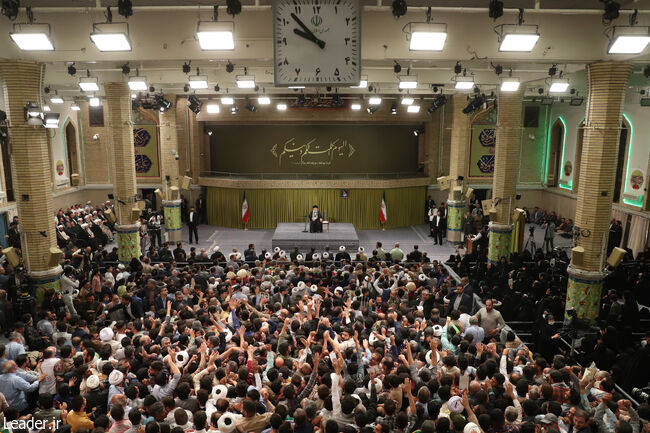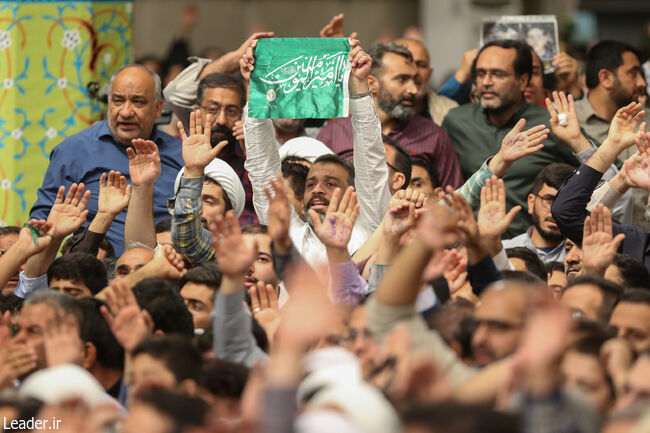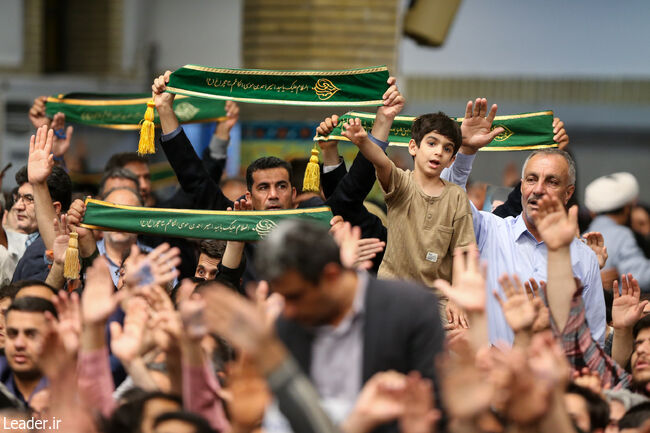On 25th June 2024, on the auspicious occasion of Eid al-Ghadir, the Leader of the Islamic Revolution met with thousands of compatriots. He described the event of Ghadir as laying the groundwork for the continuation of Islamic governance and the perpetuation of the Islamic way of life. He also referred to some of the virtues of Amir al-Mu'minin (a.s.), saying, "We have learned from our Master the populism of the Islamic system and the belief that each individual's participation impacts the country's destiny."
Ayatollah Khamenei also referred to the elections on Friday as very important, stating that a high turnout by the people and selecting the most qualified candidate would bring pride to the nation and the Islamic Republic. He outlined the characteristics of the most qualified candidate and called on all people to go to the polls. He said, "Anyone interested in a strong and proud Iran and in supporting the system should participate in the elections."
The Leader of the Revolution congratulated the Iranian nation and Muslims worldwide on the Greatest Eid, "Eid al-Akbar," saying that the people's celebration of Eid al-Ghadir in public places was a very good initiative. He referred to the Quran's interpretation of Eid al-Ghadir and the proclamation of the caliphate and guardianship of Amir al-Mu'minin (a.s.) as causing disbelievers to lose hope in defeating Islam.
He considered the continuation of Islamic political governance under the command of God and the declaration of the succession and Imamate of Amir al-Mu'minin by the blessed words of the Prophet (PBUH) to be the reason for the disbelievers' despair. He added, "The continuation of Islamic governance and policies manifested in the Imamate perpetuates the spirit of Islam."
The Leader of the Revolution described the position of Imamate as one of the most essential elements of divinely appointed prophets and higher than the position of prophecy. He added, "In prophecy, prophets convey God's commands to the people, but in the status of Imamate, the prophet instils God's commands into the hearts, minds, actions, and behaviours of the people."
Ayatollah Khamenei said that the continuation of Islamic governance through the Imamate and (spiritual) guardianship ensured the continuation of the Islamic way of life. He stated, "The goal of the 250-year-old struggle and effort by the Imams, later pursued by great Shia figures right up to the present era through the endeavours of the late Imam and the Iranian nation, was the establishment of Islamic governance, which leads to the expansion of Islamic living in society."
He explained the main lines of the Islamic way of life as justice, firmness against disbelievers, compassion with each other, the ruler's understanding of the people's suffering and hardships, and the people's support, obedience, and the assistance they give to Islamic governance. He added, "Ghadir paves the way for realising these elevating principles of Islamic living, and from this perspective, it can be a source of unity for all Islamic sects and should not be made a point of division between Shia and Sunni."
In the second part of his speech, the Leader of the Islamic Revolution elaborated on the virtues of the Commander of the Faithful (a.s). He said, "The eye of the intellect and deep thoughts of a person cannot comprehend the spiritual beauty and celestial rank of the Master (a.s.). At most, one can form only a general image in the mind. However, referring to the Nahj al-Balagha, a great divine blessing that is not exclusive to Shias, one can learn the principles, criteria, and methods of Amir al-Mu'minin and become acquainted with his virtues."
He described all the virtues of Imam Ali (a.s.) as being at their height and, referring to the Nahj al-Balagha, he added, "Certainty and being free from even a trace of despair, doubt, or hesitation, sensitivity towards every single person, regardless of their religion or creed, impeccable justice, and not being deceived by the enemy's superficial mollifications and maintaining complete vigilance against them, are some of the most outstanding virtues of Imam Ali ibn Abi Talib (a.s)."
Ayatollah Khamenei also cited Imam Ali's (a.s) profound belief in a government for the people and the mutual rights of the people and the ruler as among his virtues. He said, "We have learned the complete populism of the Islamic system from our Master (a.s) and the Quran. However, some mistakenly claim that the Islamic Republic has adopted elections, democracy, and populism from the West."
Imam Ali (a.s.) considered listening to the people's words and advice essential, even though his knowledge and wisdom were connected to the divine source. Ayatollah Khamenei cited two other virtues of Imam Ali (a.s.): his emphasis on the presence and influence of each individual, even the weakest among them, on the fate of society and the country. He added, "The Nahj al-Balagha is a treasure trove revealing and giving us an understanding of the multifaceted dimensions of the personality of Imam Ali. It is fitting that all people, especially the youth, read and resonate with the Nahj al-Balagha, learning its unsurpassed lessons."
The Leader of the Revolution addressed the upcoming presidential elections, stating, "In three days, the Iranian nation faces a crucial test in the presidential elections, the significance of which is greater than ever before." He saw holding elections 40 days after the loss and monumental public mourning of the beloved, people-oriented, hardworking president as a globally unique event. They expressed hope that God would grant victory to the Iranian nation in these elections.
Ayatollah Khamenei said that pride in elections depends on mass public participation and choosing the most qualified candidates. He said that the reason for insisting on significant participation in elections is that the pride of the Islamic Republic is the most critical outcome of a high level of participation.
Referring to the continuation of hostilities against the Islamic Republic from its inception until the present, the Leader of the Revolution cited elections and a high level of participation as factors that have overcome these hostilities. He said, "The republic and people's participation are intrinsic to the essence of the Islamic Republic, where elections and the election of the country's leader are its most important manifestations." He pointed out that whenever voter turnout in elections was low, the enemies of the Islamic Republic would amplify their criticisms. He said, "Every time voter turnout in elections has been high, the voices of critics become less, and they could not express their condemnation and joy. Therefore, another reason for insisting on high participation is not to let enemies rejoice."
In a public call to the people, Ayatollah Khamenei urged them to participate and warned against laziness, indifference, and underestimating the elections. He said, "Elections are not just for cities; people in every village and region of the country should participate in the elections so that the Islamic Republic can stand in the world with pride."
Describing the characteristics of a righteous person, the Leader of the Revolution said, "A righteous person is someone who, first and foremost, genuinely believes in the principles of the Revolution and the system with heartfelt and sincere conviction, just as dear martyr Khadhemi-Raisi truly believed, and it was palpably evident that he worked with heart, soul, and conviction."
He considered efficiency to be a significant characteristic of a righteous person and said, "Efficiency means not knowing day from night, being devoted to work, being capable of doing that work, and utilising appropriate factors and colleagues."
Ayatollah Khamenei considered the ability and enthusiasm to carry out work, along with a strong belief in the foundations of the Revolution, another hallmark of a righteous person, stating, "A righteous individual with these characteristics is capable of utilising all the diverse and abundant capacities of the country for progress."
He did not consider previous governments to have equally utilised the country's capacities. He said, "The thirteenth administration was one of those governments that made good use of the country's capacities, and if this government had continued, there would have been a high probability that many economic problems would have been solved."
Speaking about the critical capacities of the country, the Leader of the Revolution said, "The vast numbers of the young and educated, the inherent intelligence and talent of the Iranian people, the vast and diverse mineral resources, its geographical location, its extensive maritime borders, its numerous neighbouring countries, the large regional markets, its domestic market of 80 million people, its climatic diversity, its rail and road network, the technical capabilities of its youth in building housing, roads, dams, and industry, its free trade zones and its cultural and civilisational heritage are some of the capacities of the country."
He added, "Truly, the people who are believers and are committed are also very important, even if some of them do not outwardly demonstrate a proper adherence to religious law."
Ayatollah Khamenei criticised the belief held by some politicians in the country that they are inescapably dependent on being aligned with this or that world power to progress and the illusion that all paths to progress pass through America. He said, "Those whose focus is outside our borders are incapable of seeing and recognising important internal capacities, and naturally, they are unable to plan for utilising them."
He emphasised that the Islamic Republic had progressed through divine assistance without relying on foreigners despite their hostility and challenges, saying, "In the future, with the help and power of God, the Iranian nation will not allow others to determine its destiny."
The Leader of the Revolution spoke about some individuals who misconceived or misinterpreted the emphasis on utilising domestic capacities as building walls around the country and cutting off ties with the world. He said, "From the beginning, except for one or two exceptions, we have sought relations with the entire world, and in fact, during administrations such as that of martyr President Raisi's government, which were firmly committed to principles, the country's international relations were strengthened."
He considered not bowing to foreigners as a sign of courage and national independence and said, "Despite these two factors, the Iranian nation demonstrates its capability, character, and strength, and its respect in the world will increase."
Ayatollah Khamenei concluded with two important recommendations addressed to the people and the candidates.
In the first recommendation, referring to the slogan "A Strong and Proud Iran," he said, "Iran has the potential of having many supporters. Of course, Iran's strength is not just about possessing various types of missiles - of which we have various useful and practical types - but being strong includes scientific, technical, economic, and political dimensions, among which a very important aspect is participation in the arena of politics and elections."
The Leader of the Revolution continued, "Therefore, anyone interested in a strong Iran should participate in the elections, and anyone who believes in the necessity of supporting the system of the Islamic Republic should pay double attention to this matter."
His next recommendation was addressed to the presidential candidates; he asked them to pledge to God that if elected, they would not choose their colleagues and agents from those who have the slightest leanings against the Islamic Revolution.
Ayatollah Khamenei said to the candidates that anyone with even the slightest opposition or misalignment with the Revolution, the Imam, and the Islamic system would not be suitable for the candidates and would not be a good colleague. He said, "Someone who is fond of America and believes that progress cannot be made without following in America's shoes, and similarly, someone who is indifferent to the strategy of religion and Sharia, will not be a good colleague or manager. Therefore, choose associates who are devout, committed to Sharia, committed to the Revolution, and believe in the Islamic system completely."
He concluded his speech by saying, "If you work and campaign in the elections with pure intentions and a pledge to Almighty God, all your efforts will be good deeds before God and will be rewarded."



